外研版七年级上册 Module 5 My school day Unit 3 Language in use课件(共38张PPT)
文档属性
| 名称 | 外研版七年级上册 Module 5 My school day Unit 3 Language in use课件(共38张PPT) | 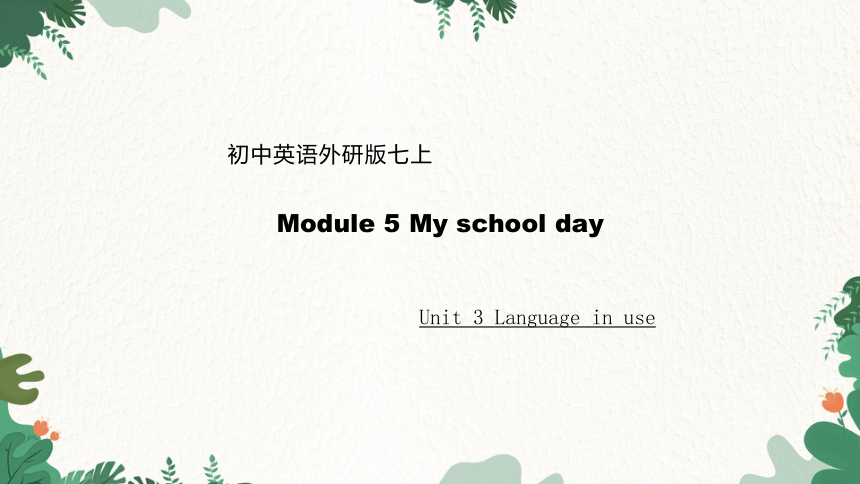 | |
| 格式 | pptx | ||
| 文件大小 | 2.9MB | ||
| 资源类型 | 教案 | ||
| 版本资源 | 外研版 | ||
| 科目 | 英语 | ||
| 更新时间 | 2023-06-11 13:18:55 | ||
图片预览

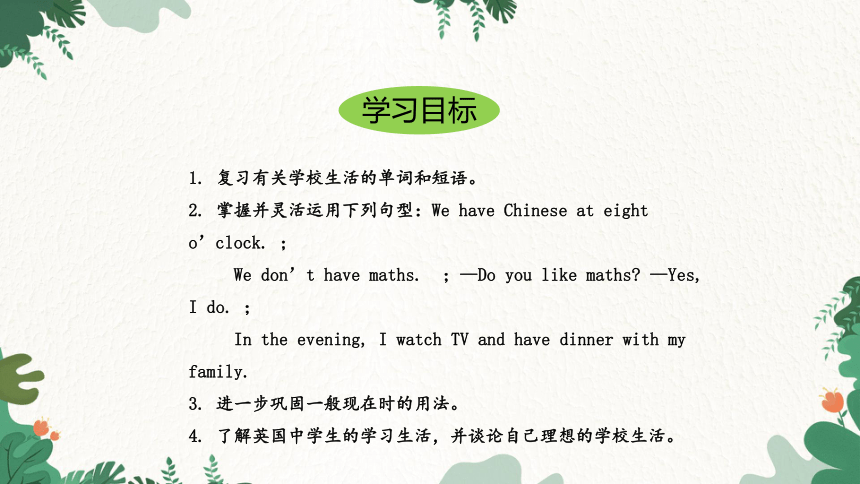
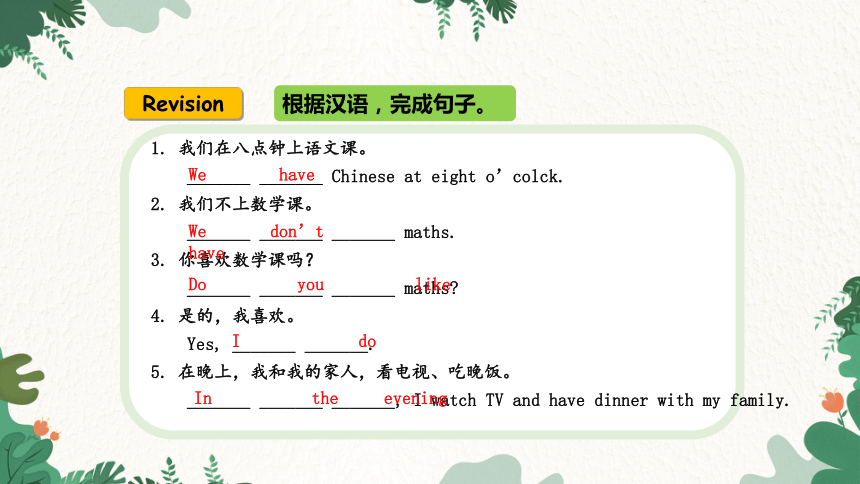
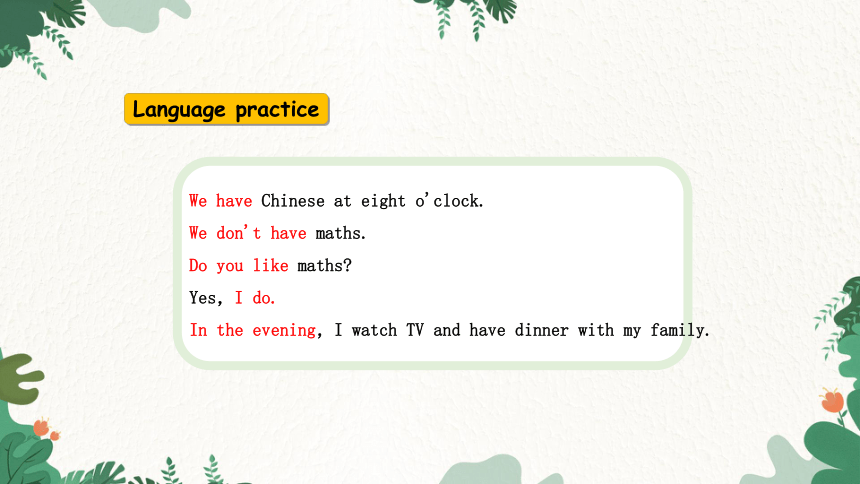
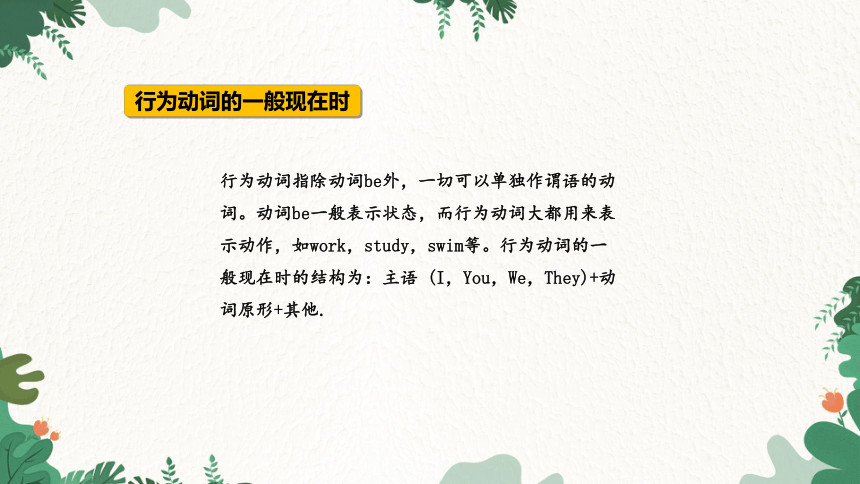
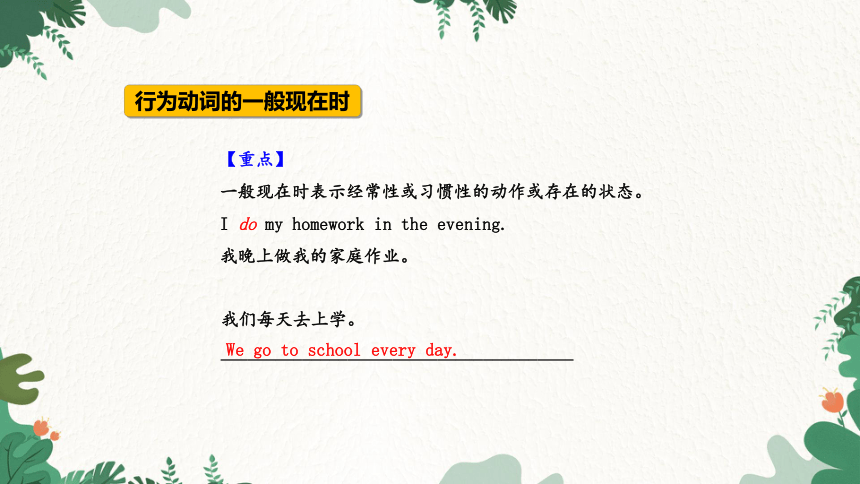
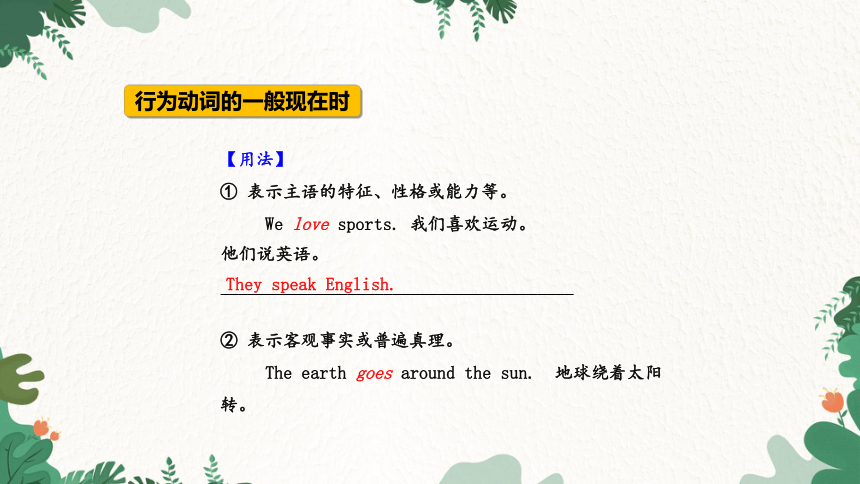
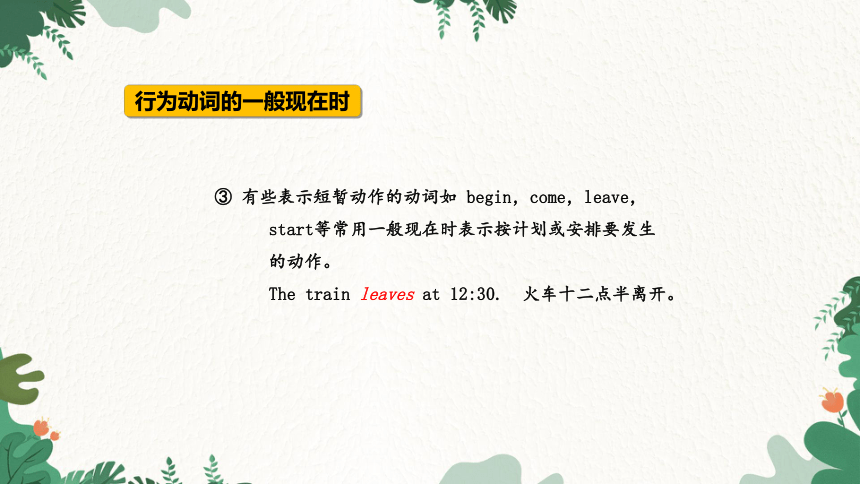
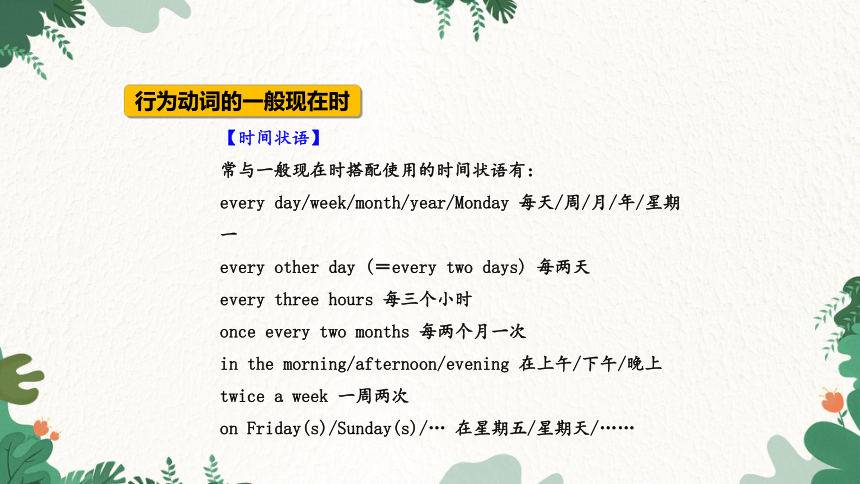
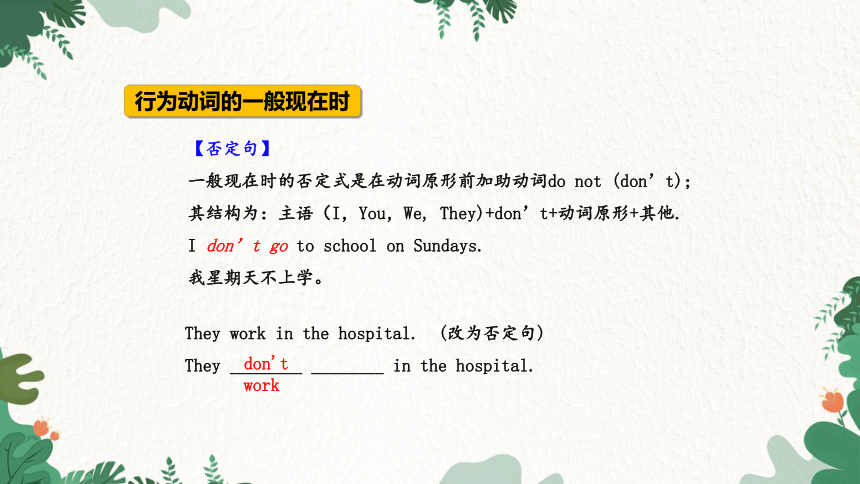

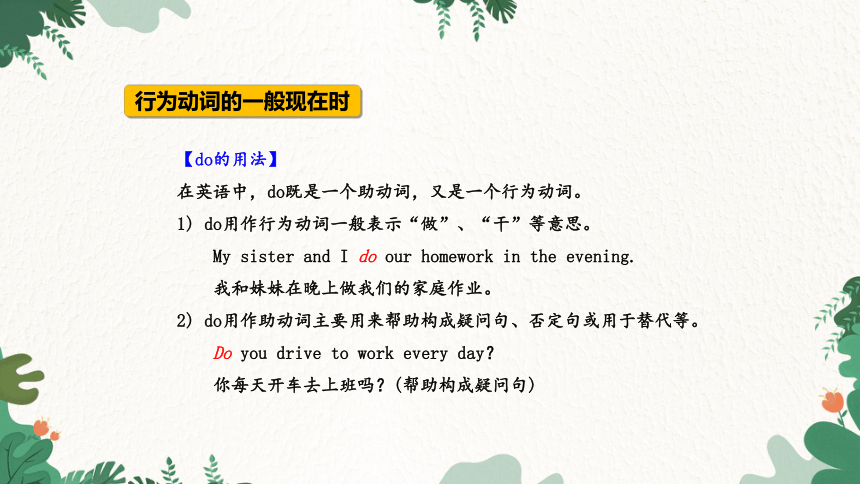
文档简介
(共38张PPT)
Module 5 My school day
初中英语外研版七上
Unit 3 Language in use
1. 复习有关学校生活的单词和短语。
2. 掌握并灵活运用下列句型:We have Chinese at eight o’clock. ;
We don’t have maths. ;—Do you like maths —Yes, I do. ;
In the evening, I watch TV and have dinner with my family.
3. 进一步巩固一般现在时的用法。
4. 了解英国中学生的学习生活,并谈论自己理想的学校生活。
学习目标
Revision
根据汉语,完成句子。
1. 我们在八点钟上语文课。
_______ _______ Chinese at eight o’colck.
2. 我们不上数学课。
_______ _______ _______ maths.
3. 你喜欢数学课吗?
_______ _______ _______ maths
4. 是的,我喜欢。
Yes, _______ _______.
5. 在晚上,我和我的家人,看电视、吃晚饭。
_______ _______ _______, I watch TV and have dinner with my family.
We have
We don’t have
Do you like
I do
In the evening
Language practice
We have Chinese at eight o'clock.
We don't have maths.
Do you like maths
Yes,I do.
In the evening,I watch TV and have dinner with my family.
行为动词的一般现在时
行为动词指除动词be外,一切可以单独作谓语的动词。动词be一般表示状态,而行为动词大都用来表示动作,如work,study,swim等。行为动词的一般现在时的结构为:主语 (I,You,We,They)+动词原形+其他.
【重点】
一般现在时表示经常性或习惯性的动作或存在的状态。
I do my homework in the evening.
我晚上做我的家庭作业。
我们每天去上学。
_______________________________________
We go to school every day.
行为动词的一般现在时
【用法】
① 表示主语的特征、性格或能力等。
We love sports. 我们喜欢运动。
他们说英语。
_______________________________________
They speak English.
行为动词的一般现在时
② 表示客观事实或普遍真理。
The earth goes around the sun. 地球绕着太阳转。
③ 有些表示短暂动作的动词如 begin,come,leave,
start等常用一般现在时表示按计划或安排要发生
的动作。
The train leaves at 12:30. 火车十二点半离开。
行为动词的一般现在时
【时间状语】
常与一般现在时搭配使用的时间状语有:
every day/week/month/year/Monday 每天/周/月/年/星期一
every other day (=every two days) 每两天
every three hours 每三个小时
once every two months 每两个月一次
in the morning/afternoon/evening 在上午/下午/晚上
twice a week 一周两次
on Friday(s)/Sunday(s)/… 在星期五/星期天/……
行为动词的一般现在时
【否定句】
一般现在时的否定式是在动词原形前加助动词do not (don’t);
其结构为:主语(I,You,We, They)+don’t+动词原形+其他.
I don’t go to school on Sundays.
我星期天不上学。
行为动词的一般现在时
They work in the hospital. (改为否定句)
They ________ ________ in the hospital.
don't work
【一般疑问句及答语】
行为动词的一般现在时的一般疑问句在句首加助动词do。
其结构是:Do+主语(I,you,we,they)+动词原形…
简略回答用助动词do和don't构成。
—Do you get up early in the morning 你早晨起得早吗?
—Yes,I do. /No,I don't.
是的,我早起。/不,我不早起。
行为动词的一般现在时
【do的用法】
在英语中,do既是一个助动词,又是一个行为动词。
1) do用作行为动词一般表示“做”、“干”等意思。
My sister and I do our homework in the evening.
我和妹妹在晚上做我们的家庭作业。
2) do用作助动词主要用来帮助构成疑问句、否定句或用于替代等。
Do you drive to work every day?
你每天开车去上班吗?(帮助构成疑问句)
行为动词的一般现在时
They don't work on Sundays.
他们星期天不工作。(帮助构成否定句)
—Do you like the job?你喜欢这份工作吗?
—Yes,I do. 是的,我喜欢。(用于替代)
行为动词的一般现在时
We go to the park at weekends. (改为一般疑问句)
________ you ________ to the park at weekends
Do go
1
Talk about your activities in a week.
I don't go to school on Sunday.
I go to the park on Sunday.
2
Match the words in Column A with the words and expressions in Column B.
A B
1 have a) dinner
b) your homework
c) to school
2 do d) a break
e) an English lesson
f) to bed
3 go g) home
2
Now talk about your school day.
Learning to learn
We often use have,do and go in English. Make notes of all the expressions you hear or see:have breakfast,do exercise,go swimming.
I go to school at half past seven in the morning.
3
Complete the passage with the expressions from the box.
On Friday I have a busy day. I (1)________ at half past six in the morning. Then I wash my hands and face,and (2)______________ at seven. At half past seven,I (3)____________,and (4)__________ at eight. There are four lessons in the morning.
do homework get up go to school have a break
have breakfast have lunch start work
get up
have breakfast
go to school
start work
3
Complete the passage with the expressions from the box.
At twenty to ten,we (5)____________ for twenty minutes. We go to the playground and I talk with my friends. We (6)__________ in the school dining hall. In the afternoon,we have two lessons and go home at half past three. I don't (7)_____________on Friday evening. I do it on Saturday.
do homework get up go to school have a break
have breakfast have lunch start work
have a break
have lunch
do homework
1. busy adj. 忙的;繁忙的,的反义词是free,busy常用结构:
be busy with sth. 表示“忙于某事”,后接名词;be busy (in)
doing sth. 表示“忙于做某事”,in可省略。
—What are you busy with every day 你每天在忙什么?
—I am busy getting ready for my exam. 我忙着为考试做准备。
Language points
He has a lot of homework to do,so he is very b____ today.
usy
4
Complete the sentences with at,in or on.
1 We go to school ________ the morning.
2 We don't go to school ________ Sunday.
3 We don't have a science lesson ________ Wednesday.
4 I get up ________ seven o'clock.
5 We go home ________ the afternoon.
6 We have dinner ________ half past six.
in
on
on
at
in
at
5
Complete the sentences with the words from the box.
1 We have maths after ________ today.
2 I like maths. It's my favourite ________.
3 Our maths teacher is very good and she makes it ___________.
4 I like it ________ it's interesting.
5 I do my maths ___________ first after school every day.
break
subject
interesting
because
homework
because break homework interesting subject
Around the world
The school day in the UK
In the UK, children have five lessons in the day and finish school at half past three in the afternoon. After school they go swimming, play football, have music lessons and play with their friends. They also do homework like you!
Language Point
2. make+宾语+adj. 使……(变得)……,在这个结构中,
形容词作宾语补足语,用来形容人的感受(happy,sad,pleased,angry等)或事物的性质或所处的状态。
The news makes me happy.
这个消息使我高兴。
Language Point
—We all like Miss Wang.
— I agree with you. She always makes her English classes ________.
A. interested B. interest C. interesting
C
【点拨】此题用分析比较法。句意:——我们都喜欢王老师。
——我同意你的观点。她总是使她的英语课有趣。
interested修饰人,interesting则修饰物。故选C。
Language Point
3. finish v. 完成;结束;用尽。后加名词、代词、动名词作宾语。
When does he finish college
他何时大学毕业?
英语习惯上说 finish doing sth. ,不能说 finish to do sth. 。
Do you finish watering the flowers
你浇完花了吗?
Language Point
—Can you finish ________ these books before 10 o'clock
—Yes,I can.
A. to read B. read C. reads D. reading
D
【点拨】此题考查非谓语动词的用法。finish后面要跟
名词或动名词作宾语,故选D。
6
Look through Module 5 and find expressions to say what you do and enjoy every day.
go to school play football …
Now complete the table with information
about your ideal school day.
8:00 am go to school
10:00 am …
12:00 pm
…
7
Work in pairs. Talk about your ideal school day.
Practice
书面表达
二顺序三要素法介绍某人一天的生活
二顺序:时间顺序和空间顺序;
三要素:1. 标题:多以My/Sb’s busy/school day为题;
2. 人物各时间段的活动:早晨、中午和晚上;
3. 总结句:总结全文,常以“I’m happy. ”或“I have a
happy/busy day. ”总结全文。
Practice
书面表达
学校生活是丰富多彩的,你是如何度过学校生活的每一天的呢?请以“My School Day”为题,描述一下你的学校生活。80词左右。
常用语句: I get up at …;I have breakfast at …;I go to school …;… begin classes …
My School Day
________________________________________________________________________________________________________________________
Practice
参考范文
My school day
Hello, my name is Zhang Lei. I get up at half past six. I have breakfast at seven o'clock. Then at about eight o'clock, I go to school. We begin our first class at half past eight. At twelve o'clock, I have lunch at school. We start lessons at two in the afternoon. At half past five I go home. I have dinner at home at six. At half past seven I watch TV with my family. At nine o'clock I go to bed. This is my school day. What about yours
Practice
名师点评
◆本文运用了“二顺序三要素法”介绍某人一天的生活:以时间为线索,
描述张磊在不同的空间(at home→at school→at home)里所做的事情;
三大要素:标题、人物在各时间段的活动、总结句。
◆本文的添彩点:
恰当运用所学的表示时间的词组:at. . . o'clock,half past. . . 等来表述自己
一天的生活及活动。
能够正确运用所学的短语get up,have breakfast,go to school,have lunch,
have dinner,go to bed等叙述自己的活动。
What about…?句型的运用给文章增添了色彩。
课堂小结
本节课主要掌握单词: park, busy, wash, face, minute;同时复习巩固单元内所学其他词汇;总结巩固I, you, we , they作主语的一般现在时;以及Do, Don’t 的用法; 介词at , in, on和与时间连用的用法。
Exercise
根据首字母和文章意思完成单词
Hello! I'm Alex Greenall. I'm a student. I want to tell you something
about my school day.
I (1) g________ up at (2) h______ past seven in the morning and have
(3) b__________. Then I go to school. Our school is next to my
(4) h________. Our lessons start at 9:00. We have three lessons in the
morning. At 11:00,we have a (5) b________ and I talk to my
friends.
et
alf
reakfast
ouse
reak
Exercise
根据首字母和文章意思完成单词
We have (6) l________ in the dining hall at 12:30. I like school
(7) l________. We have two lessons in the afternoon. We go
(8) h________ at 3:30.
In the evening,I watch TV and have (9) d________ with my family. I do my (10) h_________ and then go to bed at 10:00.
unch
unch
ome
inner
omework
1. 熟记本课时的词汇
2. 完成本课时的课后作业
Homework
Wisdom in the mind is better than money in the hand.
脑中有知识,胜过手中有金钱。
Knowledge makes humble; ignorance makes proud.
博学使人谦逊,无知使人骄傲。
Remember
Thanks for listening!
Module 5 My school day
初中英语外研版七上
Unit 3 Language in use
1. 复习有关学校生活的单词和短语。
2. 掌握并灵活运用下列句型:We have Chinese at eight o’clock. ;
We don’t have maths. ;—Do you like maths —Yes, I do. ;
In the evening, I watch TV and have dinner with my family.
3. 进一步巩固一般现在时的用法。
4. 了解英国中学生的学习生活,并谈论自己理想的学校生活。
学习目标
Revision
根据汉语,完成句子。
1. 我们在八点钟上语文课。
_______ _______ Chinese at eight o’colck.
2. 我们不上数学课。
_______ _______ _______ maths.
3. 你喜欢数学课吗?
_______ _______ _______ maths
4. 是的,我喜欢。
Yes, _______ _______.
5. 在晚上,我和我的家人,看电视、吃晚饭。
_______ _______ _______, I watch TV and have dinner with my family.
We have
We don’t have
Do you like
I do
In the evening
Language practice
We have Chinese at eight o'clock.
We don't have maths.
Do you like maths
Yes,I do.
In the evening,I watch TV and have dinner with my family.
行为动词的一般现在时
行为动词指除动词be外,一切可以单独作谓语的动词。动词be一般表示状态,而行为动词大都用来表示动作,如work,study,swim等。行为动词的一般现在时的结构为:主语 (I,You,We,They)+动词原形+其他.
【重点】
一般现在时表示经常性或习惯性的动作或存在的状态。
I do my homework in the evening.
我晚上做我的家庭作业。
我们每天去上学。
_______________________________________
We go to school every day.
行为动词的一般现在时
【用法】
① 表示主语的特征、性格或能力等。
We love sports. 我们喜欢运动。
他们说英语。
_______________________________________
They speak English.
行为动词的一般现在时
② 表示客观事实或普遍真理。
The earth goes around the sun. 地球绕着太阳转。
③ 有些表示短暂动作的动词如 begin,come,leave,
start等常用一般现在时表示按计划或安排要发生
的动作。
The train leaves at 12:30. 火车十二点半离开。
行为动词的一般现在时
【时间状语】
常与一般现在时搭配使用的时间状语有:
every day/week/month/year/Monday 每天/周/月/年/星期一
every other day (=every two days) 每两天
every three hours 每三个小时
once every two months 每两个月一次
in the morning/afternoon/evening 在上午/下午/晚上
twice a week 一周两次
on Friday(s)/Sunday(s)/… 在星期五/星期天/……
行为动词的一般现在时
【否定句】
一般现在时的否定式是在动词原形前加助动词do not (don’t);
其结构为:主语(I,You,We, They)+don’t+动词原形+其他.
I don’t go to school on Sundays.
我星期天不上学。
行为动词的一般现在时
They work in the hospital. (改为否定句)
They ________ ________ in the hospital.
don't work
【一般疑问句及答语】
行为动词的一般现在时的一般疑问句在句首加助动词do。
其结构是:Do+主语(I,you,we,they)+动词原形…
简略回答用助动词do和don't构成。
—Do you get up early in the morning 你早晨起得早吗?
—Yes,I do. /No,I don't.
是的,我早起。/不,我不早起。
行为动词的一般现在时
【do的用法】
在英语中,do既是一个助动词,又是一个行为动词。
1) do用作行为动词一般表示“做”、“干”等意思。
My sister and I do our homework in the evening.
我和妹妹在晚上做我们的家庭作业。
2) do用作助动词主要用来帮助构成疑问句、否定句或用于替代等。
Do you drive to work every day?
你每天开车去上班吗?(帮助构成疑问句)
行为动词的一般现在时
They don't work on Sundays.
他们星期天不工作。(帮助构成否定句)
—Do you like the job?你喜欢这份工作吗?
—Yes,I do. 是的,我喜欢。(用于替代)
行为动词的一般现在时
We go to the park at weekends. (改为一般疑问句)
________ you ________ to the park at weekends
Do go
1
Talk about your activities in a week.
I don't go to school on Sunday.
I go to the park on Sunday.
2
Match the words in Column A with the words and expressions in Column B.
A B
1 have a) dinner
b) your homework
c) to school
2 do d) a break
e) an English lesson
f) to bed
3 go g) home
2
Now talk about your school day.
Learning to learn
We often use have,do and go in English. Make notes of all the expressions you hear or see:have breakfast,do exercise,go swimming.
I go to school at half past seven in the morning.
3
Complete the passage with the expressions from the box.
On Friday I have a busy day. I (1)________ at half past six in the morning. Then I wash my hands and face,and (2)______________ at seven. At half past seven,I (3)____________,and (4)__________ at eight. There are four lessons in the morning.
do homework get up go to school have a break
have breakfast have lunch start work
get up
have breakfast
go to school
start work
3
Complete the passage with the expressions from the box.
At twenty to ten,we (5)____________ for twenty minutes. We go to the playground and I talk with my friends. We (6)__________ in the school dining hall. In the afternoon,we have two lessons and go home at half past three. I don't (7)_____________on Friday evening. I do it on Saturday.
do homework get up go to school have a break
have breakfast have lunch start work
have a break
have lunch
do homework
1. busy adj. 忙的;繁忙的,的反义词是free,busy常用结构:
be busy with sth. 表示“忙于某事”,后接名词;be busy (in)
doing sth. 表示“忙于做某事”,in可省略。
—What are you busy with every day 你每天在忙什么?
—I am busy getting ready for my exam. 我忙着为考试做准备。
Language points
He has a lot of homework to do,so he is very b____ today.
usy
4
Complete the sentences with at,in or on.
1 We go to school ________ the morning.
2 We don't go to school ________ Sunday.
3 We don't have a science lesson ________ Wednesday.
4 I get up ________ seven o'clock.
5 We go home ________ the afternoon.
6 We have dinner ________ half past six.
in
on
on
at
in
at
5
Complete the sentences with the words from the box.
1 We have maths after ________ today.
2 I like maths. It's my favourite ________.
3 Our maths teacher is very good and she makes it ___________.
4 I like it ________ it's interesting.
5 I do my maths ___________ first after school every day.
break
subject
interesting
because
homework
because break homework interesting subject
Around the world
The school day in the UK
In the UK, children have five lessons in the day and finish school at half past three in the afternoon. After school they go swimming, play football, have music lessons and play with their friends. They also do homework like you!
Language Point
2. make+宾语+adj. 使……(变得)……,在这个结构中,
形容词作宾语补足语,用来形容人的感受(happy,sad,pleased,angry等)或事物的性质或所处的状态。
The news makes me happy.
这个消息使我高兴。
Language Point
—We all like Miss Wang.
— I agree with you. She always makes her English classes ________.
A. interested B. interest C. interesting
C
【点拨】此题用分析比较法。句意:——我们都喜欢王老师。
——我同意你的观点。她总是使她的英语课有趣。
interested修饰人,interesting则修饰物。故选C。
Language Point
3. finish v. 完成;结束;用尽。后加名词、代词、动名词作宾语。
When does he finish college
他何时大学毕业?
英语习惯上说 finish doing sth. ,不能说 finish to do sth. 。
Do you finish watering the flowers
你浇完花了吗?
Language Point
—Can you finish ________ these books before 10 o'clock
—Yes,I can.
A. to read B. read C. reads D. reading
D
【点拨】此题考查非谓语动词的用法。finish后面要跟
名词或动名词作宾语,故选D。
6
Look through Module 5 and find expressions to say what you do and enjoy every day.
go to school play football …
Now complete the table with information
about your ideal school day.
8:00 am go to school
10:00 am …
12:00 pm
…
7
Work in pairs. Talk about your ideal school day.
Practice
书面表达
二顺序三要素法介绍某人一天的生活
二顺序:时间顺序和空间顺序;
三要素:1. 标题:多以My/Sb’s busy/school day为题;
2. 人物各时间段的活动:早晨、中午和晚上;
3. 总结句:总结全文,常以“I’m happy. ”或“I have a
happy/busy day. ”总结全文。
Practice
书面表达
学校生活是丰富多彩的,你是如何度过学校生活的每一天的呢?请以“My School Day”为题,描述一下你的学校生活。80词左右。
常用语句: I get up at …;I have breakfast at …;I go to school …;… begin classes …
My School Day
________________________________________________________________________________________________________________________
Practice
参考范文
My school day
Hello, my name is Zhang Lei. I get up at half past six. I have breakfast at seven o'clock. Then at about eight o'clock, I go to school. We begin our first class at half past eight. At twelve o'clock, I have lunch at school. We start lessons at two in the afternoon. At half past five I go home. I have dinner at home at six. At half past seven I watch TV with my family. At nine o'clock I go to bed. This is my school day. What about yours
Practice
名师点评
◆本文运用了“二顺序三要素法”介绍某人一天的生活:以时间为线索,
描述张磊在不同的空间(at home→at school→at home)里所做的事情;
三大要素:标题、人物在各时间段的活动、总结句。
◆本文的添彩点:
恰当运用所学的表示时间的词组:at. . . o'clock,half past. . . 等来表述自己
一天的生活及活动。
能够正确运用所学的短语get up,have breakfast,go to school,have lunch,
have dinner,go to bed等叙述自己的活动。
What about…?句型的运用给文章增添了色彩。
课堂小结
本节课主要掌握单词: park, busy, wash, face, minute;同时复习巩固单元内所学其他词汇;总结巩固I, you, we , they作主语的一般现在时;以及Do, Don’t 的用法; 介词at , in, on和与时间连用的用法。
Exercise
根据首字母和文章意思完成单词
Hello! I'm Alex Greenall. I'm a student. I want to tell you something
about my school day.
I (1) g________ up at (2) h______ past seven in the morning and have
(3) b__________. Then I go to school. Our school is next to my
(4) h________. Our lessons start at 9:00. We have three lessons in the
morning. At 11:00,we have a (5) b________ and I talk to my
friends.
et
alf
reakfast
ouse
reak
Exercise
根据首字母和文章意思完成单词
We have (6) l________ in the dining hall at 12:30. I like school
(7) l________. We have two lessons in the afternoon. We go
(8) h________ at 3:30.
In the evening,I watch TV and have (9) d________ with my family. I do my (10) h_________ and then go to bed at 10:00.
unch
unch
ome
inner
omework
1. 熟记本课时的词汇
2. 完成本课时的课后作业
Homework
Wisdom in the mind is better than money in the hand.
脑中有知识,胜过手中有金钱。
Knowledge makes humble; ignorance makes proud.
博学使人谦逊,无知使人骄傲。
Remember
Thanks for listening!
同课章节目录
- Starte
- Module 1 My teacher and my friends
- Module 2 My English lesson
- Module 3 My English book
- Module 4 My everyday life
- Module 1 My classmates
- Unit 1 Nice to meet you.
- Unit 2 I'm Wang Lingling and I'm thirteen years ol
- Unit 3 Language in use.
- Module 2 My family
- Unit 1 Is this your mum?
- Unit 2 These are my parents.
- Unit 3 Language in use.
- Module 3 My school
- Unit 1 There are thirty students in my class.
- Unit 2 The library is on the left of the playgroun
- Unit 3 Language in use.
- Module 4 Healthy food
- Unit 1 We've got lots of apples.
- Unit 2 Is your food and drink healthy?
- Unit 3 Language in use.
- Module 5 My school day
- Unit 1 I love history.
- Unit 2 We start work at nine o'clock.
- Unit 3 Language in use.
- Revision module A
- Module 6 A trip to the zoo
- Unit 1 Does it eat meat?
- Unit 2 The tiger lives in Asia.
- Unit 3 Language in use.
- Module 7 Computers
- Unit 1 How do I write my homework on the computer?
- Unit 2 When do you use a computer?
- Unit 3 Language in use.
- Module 8 Choosing presents
- Unit 1 I always like birthday parties.
- Unit 2 She often goes to concerts.
- Unit 3 Language in use.
- Module 9 People and places
- Unit 1 We're enjoying the school trip a lot.
- Unit 2 They're waiting for buses or trains.
- Unit 3 Language in use.
- Module 10 Spring Festival
- Unit 1 Are you getting ready for Spring Festival?
- Unit 2 My mother's cleaning our houses and sweepin
- Unit 3 Language in use.
- Revision module B
